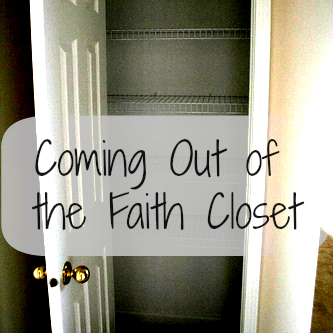Interfaith dialogue is a mainstay of modern interfaith relations. It is touted as a way to bring communities together and find common ground. I’m not sure I could find many theists who would say, “Yeah, interfaith dialogue is a bad thing.” No one says that, at least not openly. But is it true that interfaith dialogue is always helpful?
Definition
I guess we’d have to start with a definition of interfaith dialogue, right? Generally when I think of “interfaith dialogue”, I think of a panel of worldviews (aka religions) that are supposed to talk on a common topic. Usually, it’s Christian-Jew-Muslim, if anything. Sometimes, it’s different branches of the same faith. Rarely are less favored religions (although not necessarily less common) allowed: pagans, Hindus, atheists, etc. So there’s that element right off the bat. Interfaith dialogue is usually a separate thing from interfaith debates, where two opposing religions debate a specific topic. (Example – Ken Ham and Bill Nye debate creationism)
Purpose
The purpose of interfaith dialogue is to promote what? Religious pluralism? A perspective on other religions? Shared humanity? Respect? Something like that. I personally enjoy interfaith dialogue when it’s on a topic I genuinely want to know more about. Here are some panels I’ve found very inspiring lately:
What Religious Thinkers Actually Say About Interfaith Dialogue – is it useful?
Whoa, that Google search was huge. Here’s a fraction:
The Purpose of Interfaith Dialogue from the Markfield Institute of Higher Education:
“Inter-faith dialogue is not based on a model of negotiation between parties who have conflicting interests and claims. Rather it sees its role as a process of mutual empowerment for the faiths involved. It is about engagement in public concerns and the joint pursuit of social justice, human dignity and constructive action on behalf of the common good of all citizens. In this endeavour followers of faiths are expected to draw upon their spiritual resources. In fact the demands that our faiths put on us, in a simple and straightforward manner, are demands that require enormous courage and charity.”
Pagans in Interfaith Dialogue from Patheos:
“Interfaith dialogue between the so-called “mainstream” churches and Pagans of all kinds, indigenous peoples to Neo-Pagans, is a tremendous opportunity to learn more about the many forms of spirituality on this earth, and the rich and diverse way that those spiritualities manifest. But to experience and benefit from such a dialogue it must be approached without the preconceptions that have colored much of the communication up to now.
I suggest that we all adopt Wilfred Cantwell Smith’s recommendation, at least in the interfaith sphere. Ask new and unknown groups about their faith and their practice. Do not ask questions that are loaded with preconceptions based on your own assumptions about religion; otherwise you will likely hear what they think you want to hear rather than what they want to say and what they are. Accept that the Divine can manifest for others in ways you may never have considered. We can all only be enriched by such an exchange.”
When No One Is Wrong: A Response to the Interfaith Movement from Focus on the Family:
“The only way I can be an effective witness is to respect other people and their beliefs. I think this is going to make us more authentic; we don’t get to pretend anymore. If you’re going to follow Jesus you have to be serious, it’s not just something that’s part of our culture.”
Still, the challenge lies before us. How can the church join hands with those who may in fact despise our foundational beliefs? And how will those groups respond when we refuse to validate behavior the Scriptures overtly condemn?
Of course something that transcends all cultural differences is the love of God for a fallen mankind. People loved to be around Jesus. He attracted people of all backgrounds from Gentiles and Jews, to those involved in the occult. Some came for healing, others seeking answers to tough questions. Regardless, Jesus didn’t turn anyone away. He came that none should perish, promising eternal life to those who believed.
Pastor Silva believes that message needs to be part of the interfaith dialogue. “Let’s not forget what our call really is. If you don’t share the truth of salvation, have you really loved your neighbor?”
There’s no point in interfaith from The Guardian:
“But this is to assume that religious differences are among the fundamental causes of conflict. They are not. Religion is a mere marker of differences: it is epiphenomenal. Crusades, jihads and inquisitions are spurred by economic interests, tribal loyalties and secular politics. The Crusades, that paradigm of religious warfare, were land-grabs: western knights made war on Muslims and Orthodox Christians alike and, unable to get Jerusalem back, took Constantinople.”
Of What Purpose is Interreligious Dialogue Part 1 and Part 2 from John Armstrong:
“Interreligious dialogue helps us to correct our incredible ignorance and to avoid the constant clash of civilizations. Cardinal Tauran concluded: “We should avoid the clash of ignorances.” ”
“Perhaps the most obvious reason evangelicals have not engaged in interreligious dialogue, at least until very recently (and this is mostly at the academic level), is that evangelicals embrace a rather narrow view of proclamation which crowds out all other methods of communication and warm relationships with other people. if we do not “preach” to others then we feel we have not responded properly.”
Should Christians engage in inter-faith dialogue? from The Methodist Church in Singapore
“Space does not allow the discussion of the relationship between dialogue and witness. Let me end by reiterating the fact that dialogue or interaction with people of other religions is part of our social responsibility as Christians. We must always conduct such exchanges with integrity and respect. Respect for the other requires that we be honest, transparent and truthful.”
Interfaith Dialogue: Part II, What and Why from The American Muslim (TAM)
“We might start a definition by explaining what it is not. Constructive dialogue is not mere tolerance, because tolerance can mean only “I won’t kill you yet”. It is not even respect for diversity, because such respect may mean only “You are here damn it, and I can’t do much about it”. Real religious dialogue is the kind of pluralism that means “We welcome you because we each have so much to learn from each other”. ”
Interfaith Dialogue Must Include Atheists from the Huffington Post
“Any discomfort religious people experience over engaging with the nonreligious must be set aside for the sake of truly inclusive interfaith collaboration. This isn’t to say that such hesitancy is entirely unmerited; just as there are Christians who seem to have the sole mission of converting others to their religion, there are many atheists who only engage with people of faith in hopes of convincing them to abandon their tenets. But there are also atheists who are content to listen and to share, to dialogue instead of debate. They are part of a growing population of people who don’t believe in God but still want the same things everyone else wants: meaning, community, and a better world.”
Conclusion
My conclusion is that, while interfaith dialogue does not really hurt, it doesn’t really do all that much either to the people who really need to have their minds opened. The ones who go to events are probably already tolerant and willing to learn. Or, they into these things with their own preconceived notions and set worldviews, and most aren’t looking for their minds to be changed. So I say, keep on talking. Hopefully, the end result will at least be mutual respect. And hopefully we will learn that there are more religions than Judaism, Christianity, and Islam in the world, including no religion at all.














